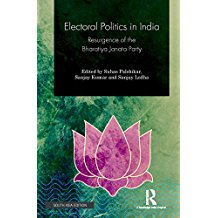This 19-chapter volume is another offering, and a part of a continuing exercise, from the Centre for the Study of Developing Societies-Lokniti research network on elections in India. Analysing the 2014 general election, the CSDS-Lokniti team figures out resurgence of the Bharatiya Janata Party (BJP) in Indian politics, a phenomenon that has been slowly but surely taking shape. For twenty-five years, before this election, no political party had an ascendant position in Indian politics, a return of the post-Rajiv Gandhi Congress to power in 1991 notwithstanding. As the process of the sixteenth general election were set in motion and Lal Krishna Advani was gearing up to lead the BJP and stake his claim to the country’s premiership for the umpteenth time, the then Gujarat Chief Minister Narendra Modi threw his hat in the ring and the Sangh Parivar leadership accepted his claim, changing the equation in the Party and the country. The first leader to emerge on the national stage on his own since Indira Gandhi in 1971, Modi took the country by storm. What factors, aside from leadership, influenced this key election?
Was BJP’s 2014 victory, unprecedented that it was, so sudden to surprise one and all? Though not directly, but the study answers this question at the outset when it says that the party’s spectacular victory in nine states could be achieved as they are ‘described as “primary states” of the party’s influence.’ (p. 3). Obviously, slowly but surely, the party has been expanding since its poor show in 1984. Indeed, it took three decades to attain an absolute majority in the Lok Sabha and an ascendance in Indian politics as never before, it was looked upon as a possible victor, even if as the leader of the National Democratic Alliance (NDA), in 2014 as the Congress and the United Progressive Alliance lost all political credibility. The study confirms the consolidation of the ‘post-Congress polity’, a description of the post-ninth general election (1989) Indian polity used by the CSDS-Lokniti school, since the Congress for the first time plummeted to 44 MPs in the Lok Sabha, eleven short of recognition as official opposition.

